A Future in the Light of Darkness by Frieda Toranzo Jaeger
at Modern Art Oxford.
Frieda Toranzo Jaeger takes painting as her subject and medium, Fusing classical imagery and techniques with intricate embroidery, her canvases of driverless cars, engines and spacecraft explore hybridity and automation to imagine alternative, post-capitalist and decolonised futures.
In order to think differently about the future, Toranzo Jaeger looks back into the past, revissiting and subverting well-known iconography and motifs from western art history to disrupt linear concept of time. Lucas Cranach's Fountain of Youth (1546) is reimagined as a queer utopia. Cranach's Adam and Eve (1528) is additionally recast with two Eves, while Hans Memling's Last Judgement (c.1460s) is repurposed to signal climate emergency and societal collapse.
Taking inspiration from 15th century altarpieces, many of Toranzo Jaeger's works are formed of multiple panels which are hinged together to create three-dimensional forms. Often approximating the scale of the human body, Toranzo Jaeger's autonomous vehicles and grinding engines invite us to take a ride through time, revisiting and rethinking dominant social norms and histories to 'decolonise our imaginations and ideas'.
The history of painting is further complicated by the integration of pre-Columbian embroidery traditions, which Toranzo Jaeger creates collaboratively with members of her family. The embroidered stitch punctuates the canvas surface, centering indigenous creative practice and refusing art historical hierarchies, which distinguished painting from craft and overlooked non-western practices.
Toranzo Jaeger's vehicles are almost always painted with a focus on the everyday apparatus of the car interior: cup holders, armrests and electric windows. For Toranzo Jaeger, the car interior is a metaphor for the 'psychological space of hyper-capitalism'. These sleek surfaces represent the inescapability of capitalism, because any critique can only operate from within its structures and confines. By reimagining the plush leather upholstery and shiny steering wheels as a site for gay lovemaking, or overgrown with brightly coloured flora and greenery, Toranzo Jaeger reimagines these hyper-capitalist technologies as possible sites for gay decolonial worlds.
Open Your Heart Because Everything will change, 2023, (oil and embroidery on canvas), hardware; 32 parts)

Open Your Heart Because Everything Will Change, is a vast double-sided heart composed of 32 hinged canvas panels which depict an engine on one side and a motherboard with a writhing mass of cables on the other. The title of the work suggest a cautious hopefulness which threads throughout the exhibition.
End of Capitalism, the Fountain, 2022, (oil and embroidery on canvas)
looking closer
At Venus' Feet, 2020, (oil and embroidery on canvas)
Four Seasons; Autumn, 2021, (oil on wood, metal, wire, and motor)
Four Seasons; Spring, 2021, (oil on wood, metal, wire, and motor)
Four Seasons, Summer, 2021. (oil on wood, metal, wire, and motor)
Four Seasons; Winter, 2021, (oil on wood, metal, wire, and motor)
Partially open
Open
Cranach's Adam and Eve (1528) recast with two Eves
Enjoy a Tus Pies (I'm at Your Feet), 2023, (folded heart, 4 parts, oil on canvas)

The heart, which appears in various guises throughout the exhibition, is a persistent motif in Toranzo Jaeger's work. This ubiquitous symbol has been prevalent in visual culture since the Middle Ages, often associated with love and devotion. Toranzo Jaeger explains: 'I like the symbol of the heart because it talks about our desires, not our needs'. The hyper-capitalism of contemporary digital life, fuelled by 'hearts' and 'likes' is, for Toranzo Jaeger, a 'machine of endless desire'. In two of the works she takes the heart and seemingly drops it onto the floor. The hinged canvas panels of the broken heart collapse into one another, symbolising the 'disaster' of our capitalist desires.
The Beginning of the End, 2020, (oil and embroidery on canvas)
El Poema se Cayo (the poem fell down), 2023, (oil and embroidery on canvas, rhinestones)
Toranzo Jaeger's interest in painting traditions expands beyond Christian iconography into the 20th century. Recently her research and approach to painting has been centred on Mexican muralism, particularly the work of Diego Rivera and his role in the western narratives of Mexican art history, which she seeks to problemarise and challenge.
Through reviewing history, Toranzo Jaeger invites us to think critically about the colonial legacies of oppression that shape our understanding of the past, and instead rethink and revise these ideas to imagine alternate futures.
To see some of Diego Rivera's work go here
If the Future is Full of Death, the Past is the Only Alternative Source of Inspiration to the Traditions and Memories of a Zombified World, 2023, (3 panel altar, oil and embroidery on canvas, rhinestones)
An altarpiece painting, created in the traditional three panel format, which depicts the interior view of a driverless car hurtling through outer space. Toranzo Jaeger is attracted to the sculptural form of traditional winged alterpieces because they were transportable and could be shown in different formations, giving them a performativity. In this way, the portable altar was used as an ideological tool by 15th century European colonialists to introduce Christianity in Central and South America and beyond. Here, Toranzo Jaeger repurposes this religious device in a critical examination of commercial space travel, and particularly the capitalist neo-colonialism of the current 'race to space'.
The title of this work is depicted in glittering rhinestones on the outside panels, the kitsch aesthetic intentionally contrasting with the sombre prophecy of the words.

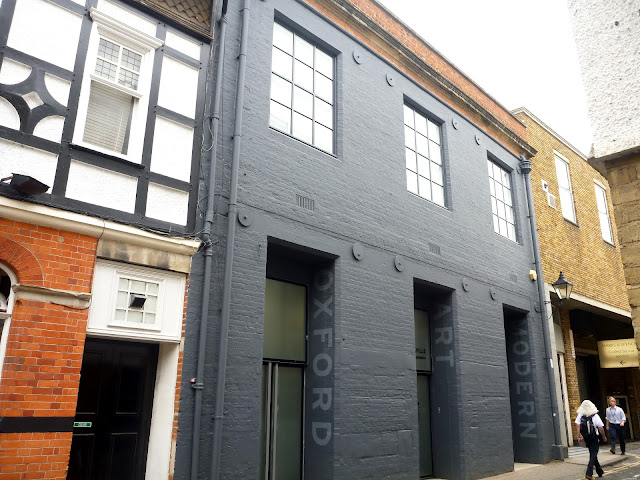


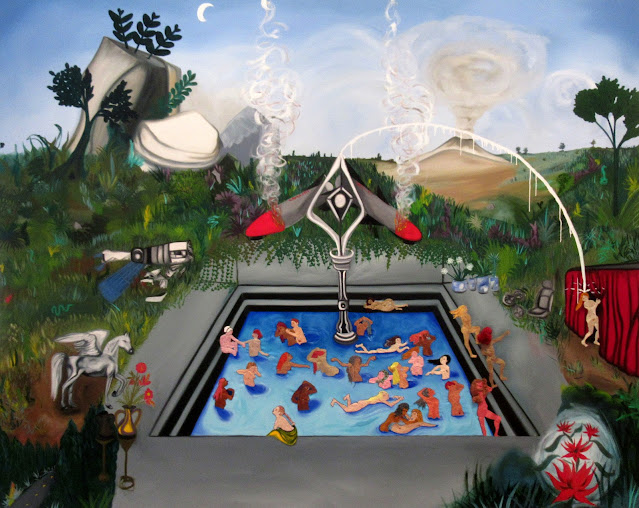












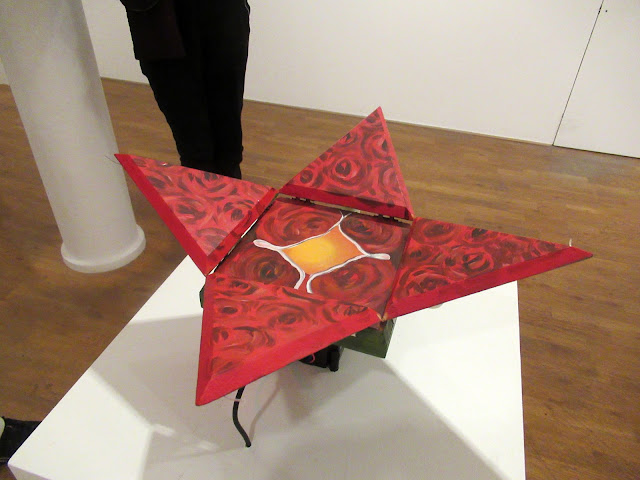




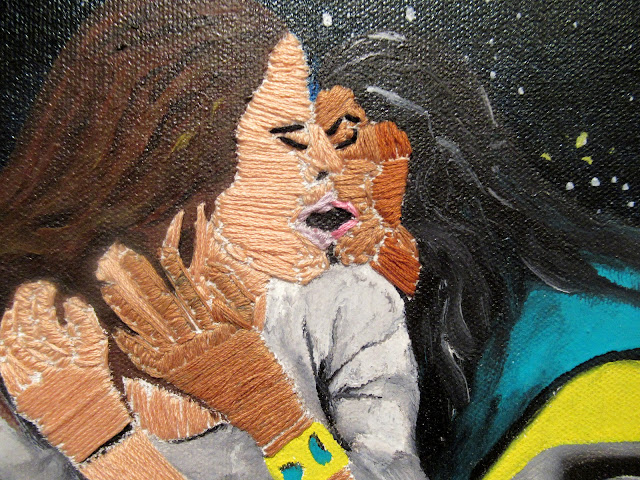






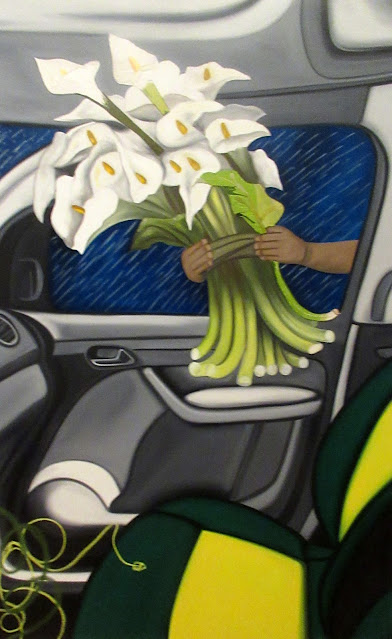




No comments:
Post a Comment